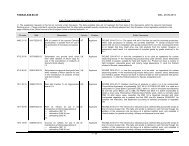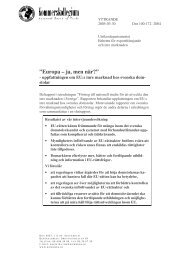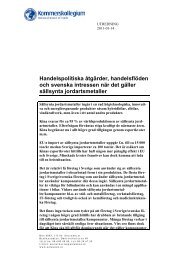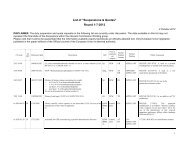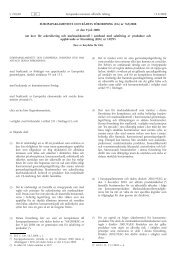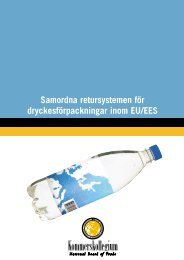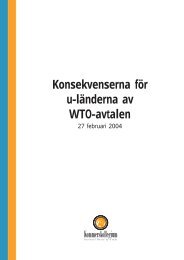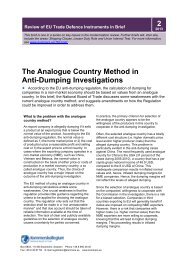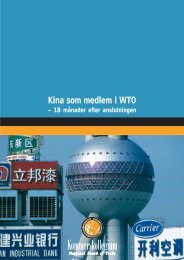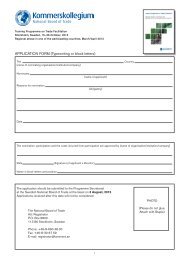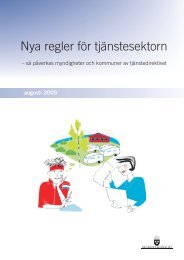Trade Facilitation - Impact and Potential Gains - Kommerskollegium
Trade Facilitation - Impact and Potential Gains - Kommerskollegium
Trade Facilitation - Impact and Potential Gains - Kommerskollegium
- No tags were found...
You also want an ePaper? Increase the reach of your titles
YUMPU automatically turns print PDFs into web optimized ePapers that Google loves.
2.4.3 Governmental BodiesA very large part of the costs of trade administration procedures are generated inthe actual cross border situation where governmental bodies are the main actor(Customs, health authorities, export licence authorities, agriculture departments,chambers of commerce, Consulates, PSI Agencies, 6 etc). The need <strong>and</strong> potentialgains from facilitating Customs <strong>and</strong> other administrations are thus great <strong>and</strong> areperhaps the most important parts to start with <strong>and</strong> focus upon, in tradefacilitation.Customs <strong>and</strong> other authorities are faced with the apparently contradictoryobjectives of enforcing government regulations while at the same time posing theminimum obstacle to legitimate trade.The central body involved is of course the Customs, which check all thedocuments <strong>and</strong> incoming (<strong>and</strong> sometimes outgoing) goods. The port operationsare in practice so closely related to Customs controls that procedures theoreticallyconnected to port management (<strong>and</strong> thus perhaps the transport sector) will beincluded under the heading of Customs procedures.Yet the procedures for a trader, with regard to governmental dem<strong>and</strong>s, starts longbefore the actual border crossing, with finding out what specific information aparticular country dem<strong>and</strong>s. Then follows the process of collecting <strong>and</strong> providingthe right data <strong>and</strong> documentation including possible stamps <strong>and</strong> signatures <strong>and</strong>acquiring the right certificates <strong>and</strong> licenses for the goods, etc. At the actual bordercrossing all these various documents might have to be present physically togetherwith the goods <strong>and</strong> sometimes also checked manually.2.5 PaymentThe payment cycle usually starts when the Supplier has accepted the Order. TheCustomer makes the necessary arrangements to pay the Supplier on completion ofthe terms of the contract. When the Supplier requests for the payment, theCustomer instructs his Bank to initiate the payment. The payment is thenexecuted through the banking system.One widely used method is the use of a Letter of Credit (L/C), which is adocument, meant to guarantee the seller payment. However, the requirements forthe buyer to acquire a L/C might in some countries be very dem<strong>and</strong>ing <strong>and</strong>contribute to considerable costs. Governmental exchange control regulations inimporting countries, as well as slow remittance of funds by international banks(which in interests alone can amount to substantial losses) constitute furtherproblematic <strong>and</strong> expensive procedures in international trade.All stages, but one, in an International Supply Chain can in a sense be describedas business agreements between private actors – the exception being the processesconnected to governmental bodies/dem<strong>and</strong>s.The Customs <strong>and</strong> governmental procedures are however the most vital link toimprove in the trade chain <strong>and</strong> the facilitation of the governmental trade dem<strong>and</strong>sis seen, by the UN, WTO, World Bank <strong>and</strong> by the Swedish enterprises, as themost essential aspects to improve. This area has the greatest potential forsubstantial gains both for the state, the companies <strong>and</strong> ultimately for theindividual consumer.6The country of import may dem<strong>and</strong> that a Pre-Shipment Inspection (PSI) Agency inspects the goods<strong>and</strong> documents in the exporting country before the actual shipping.10



